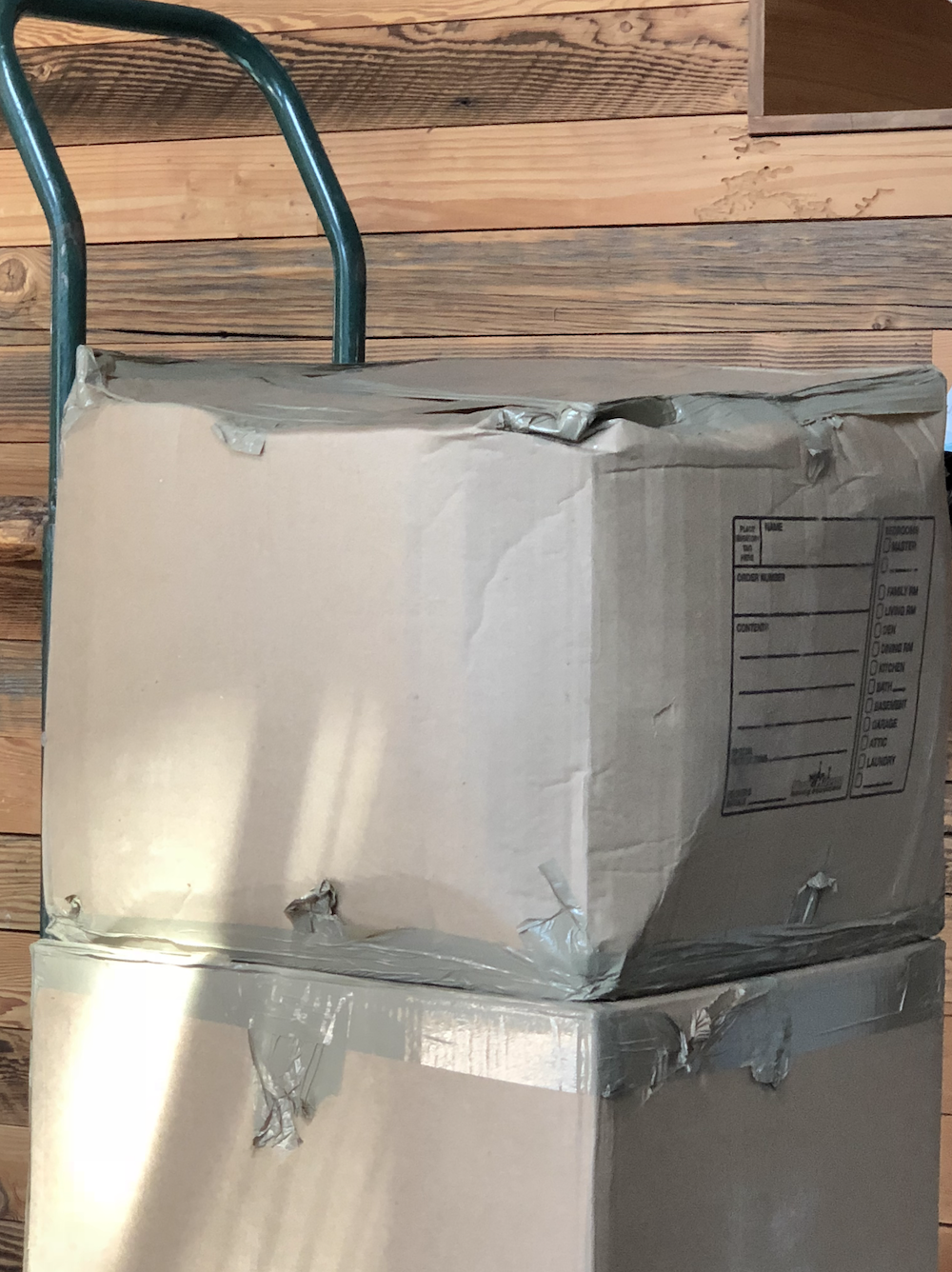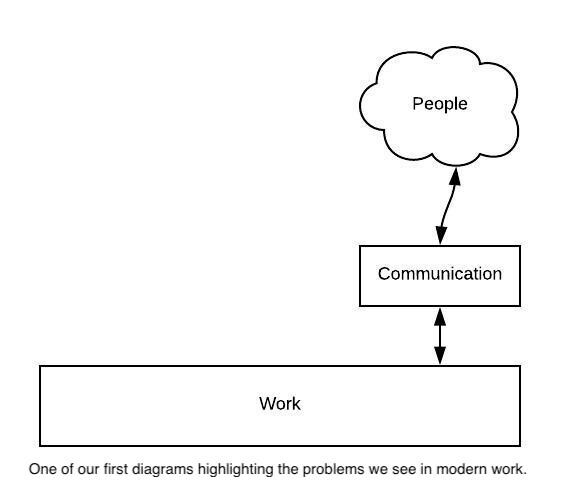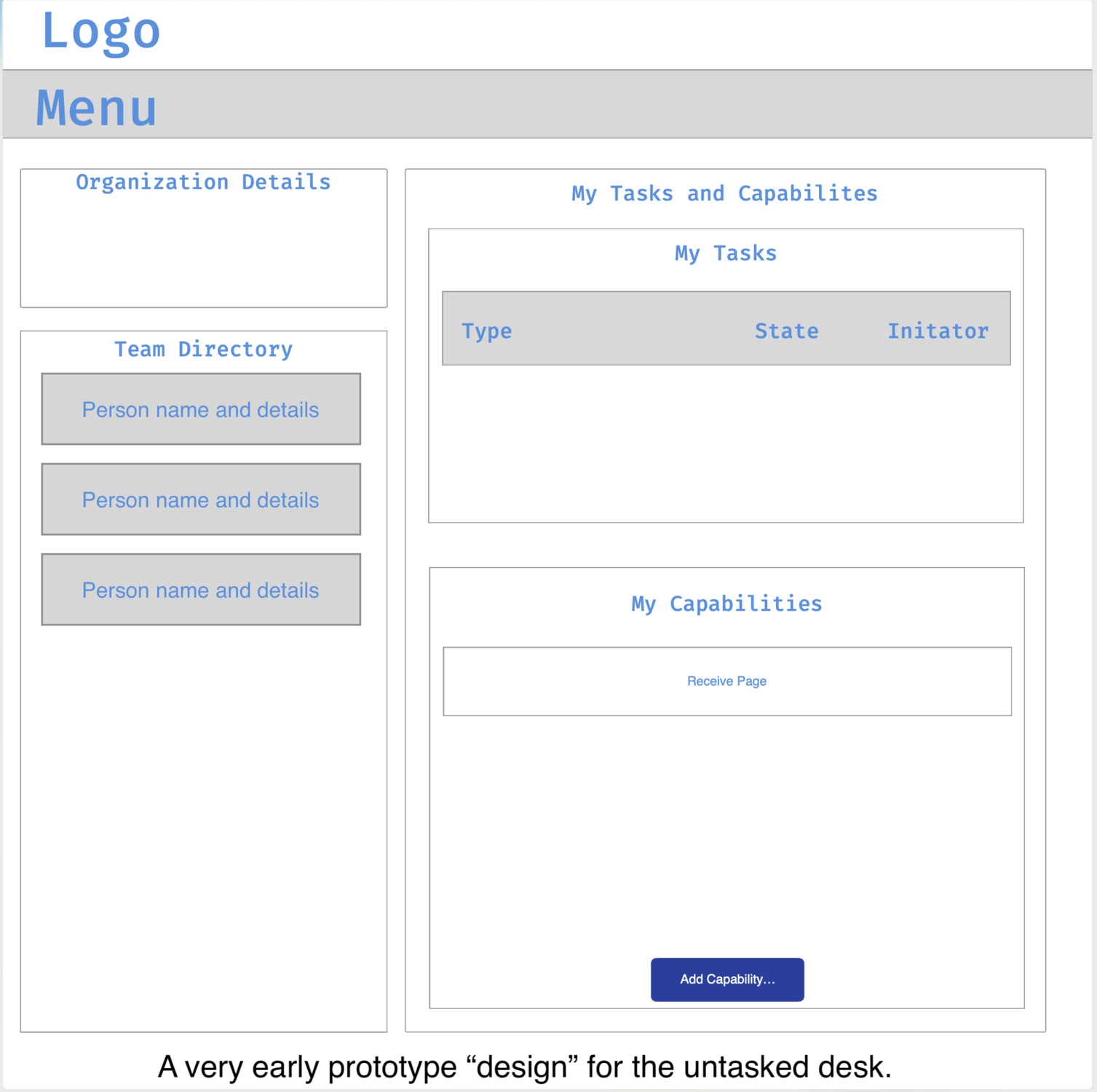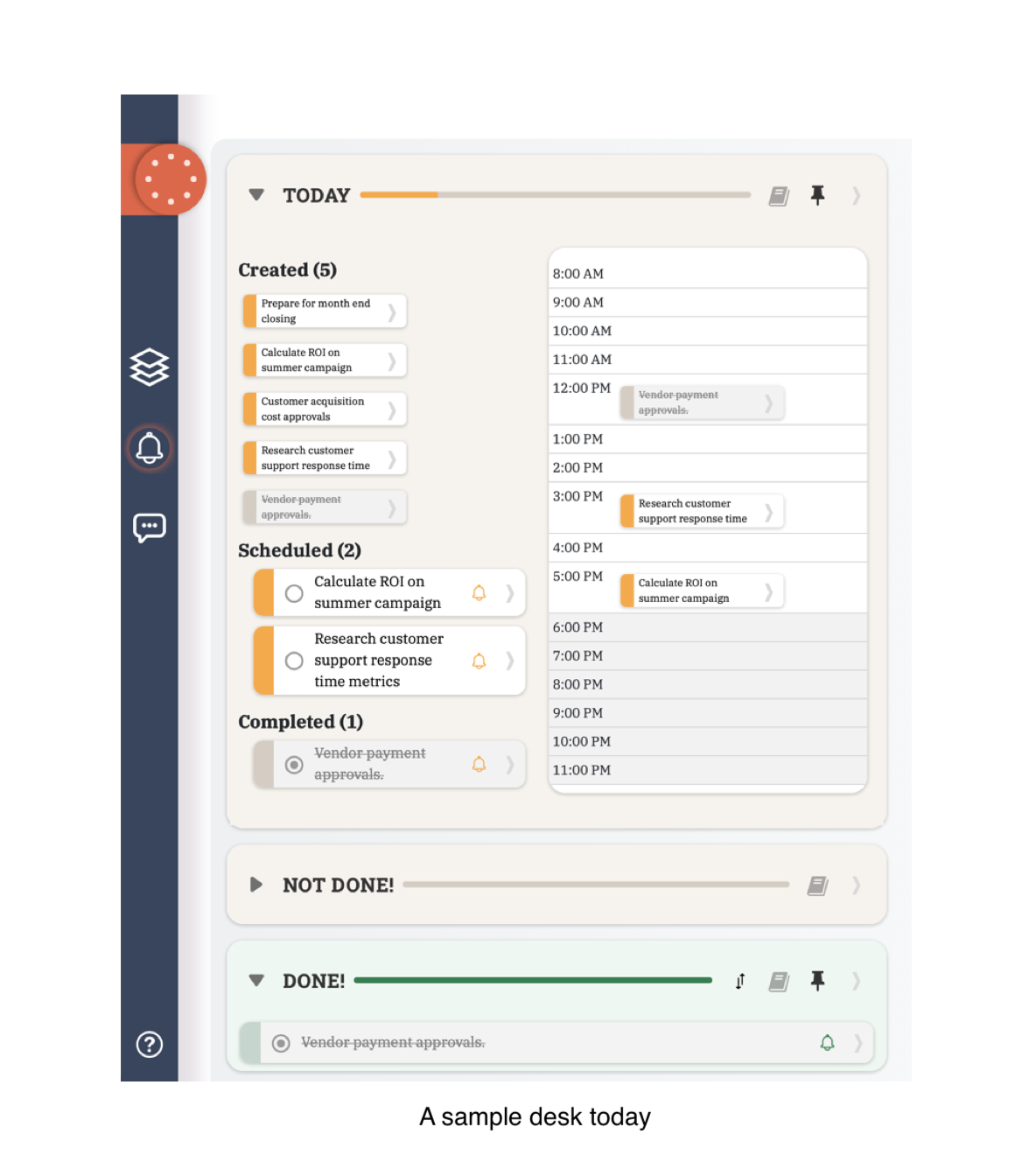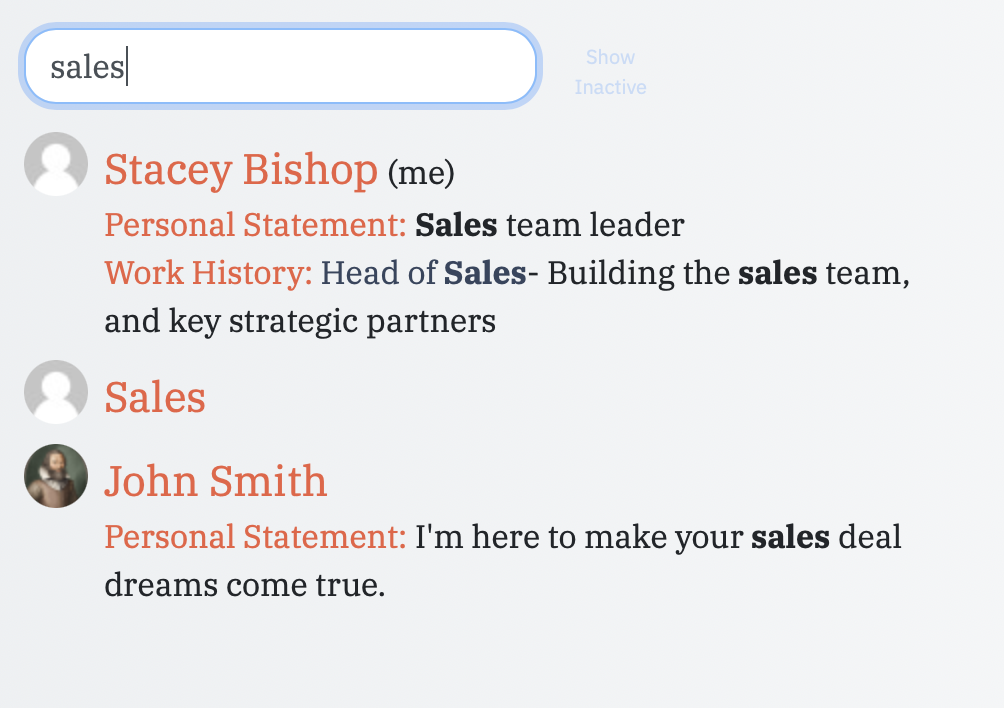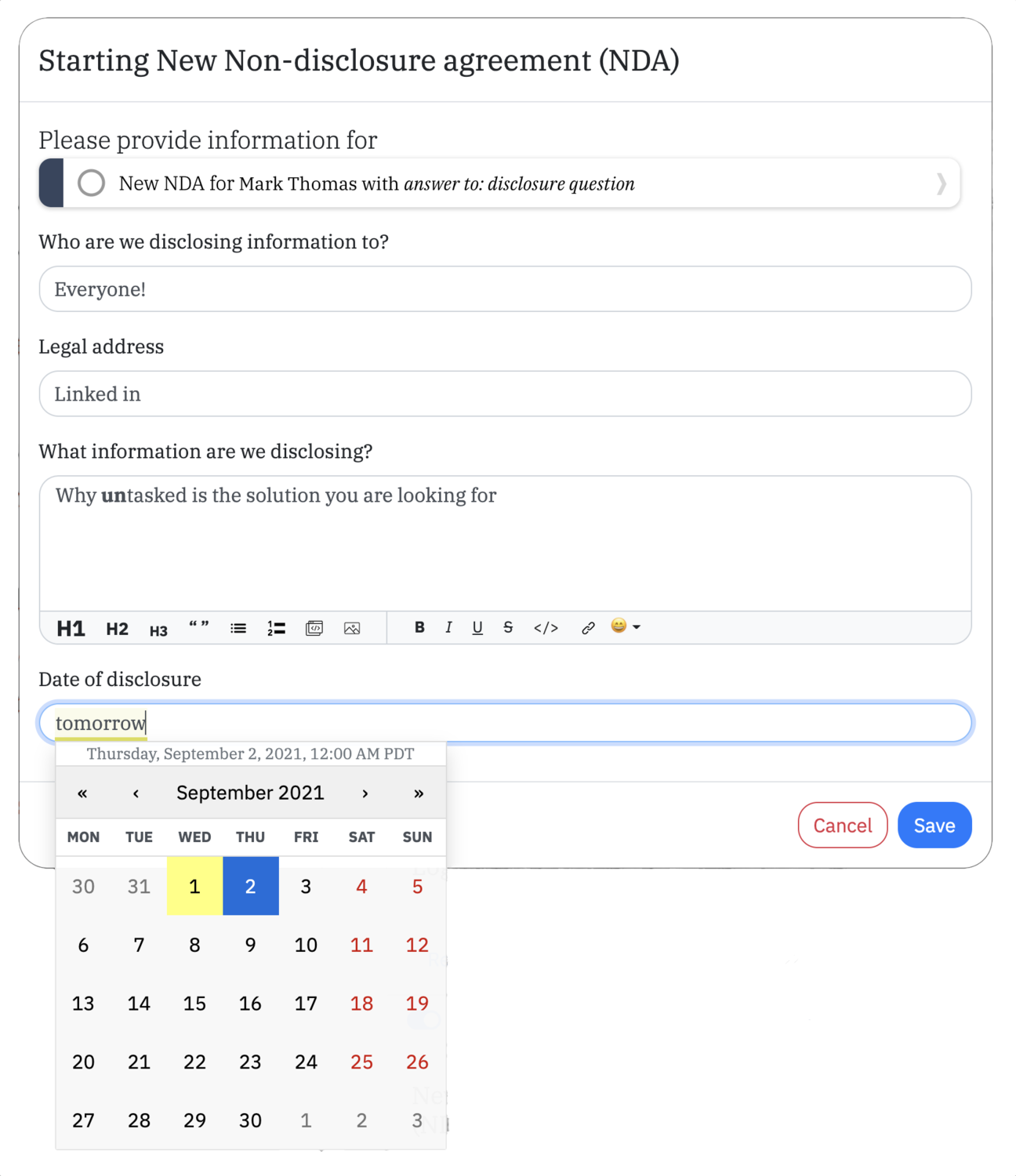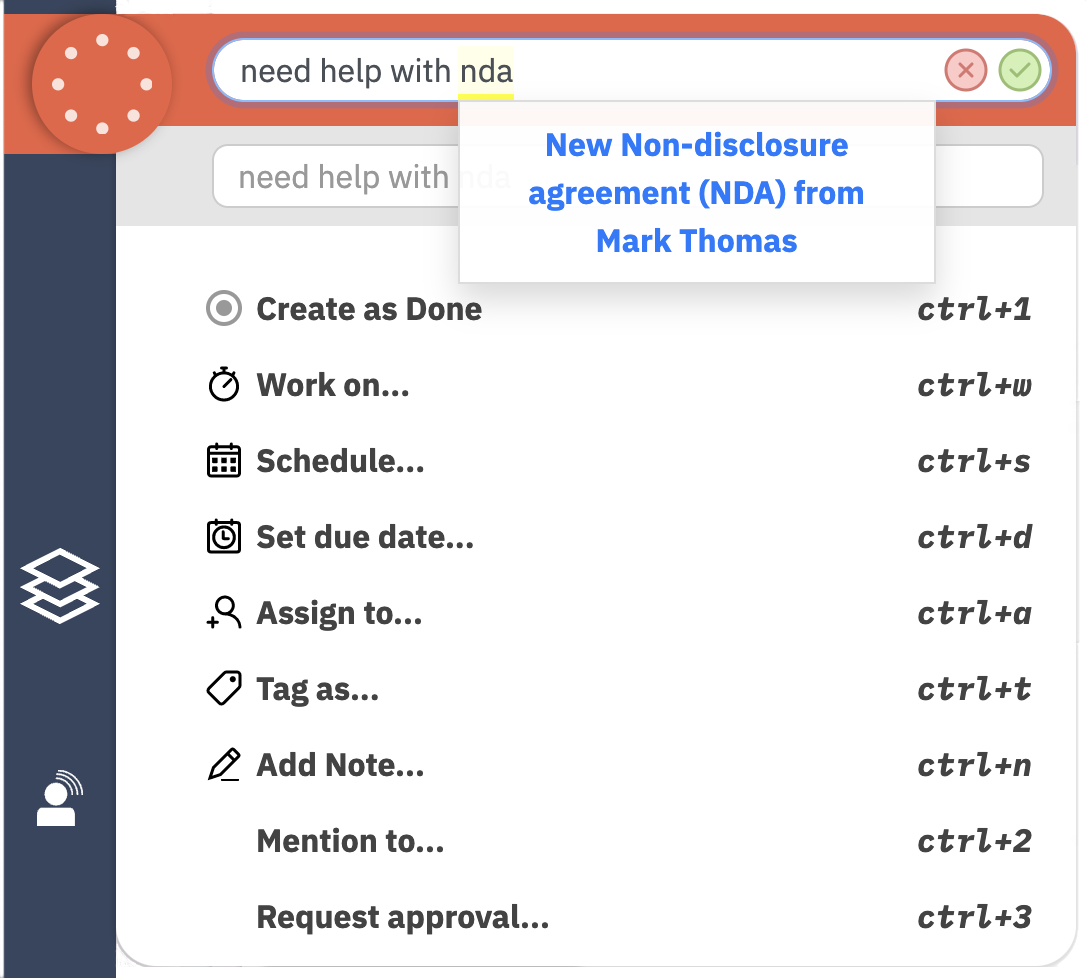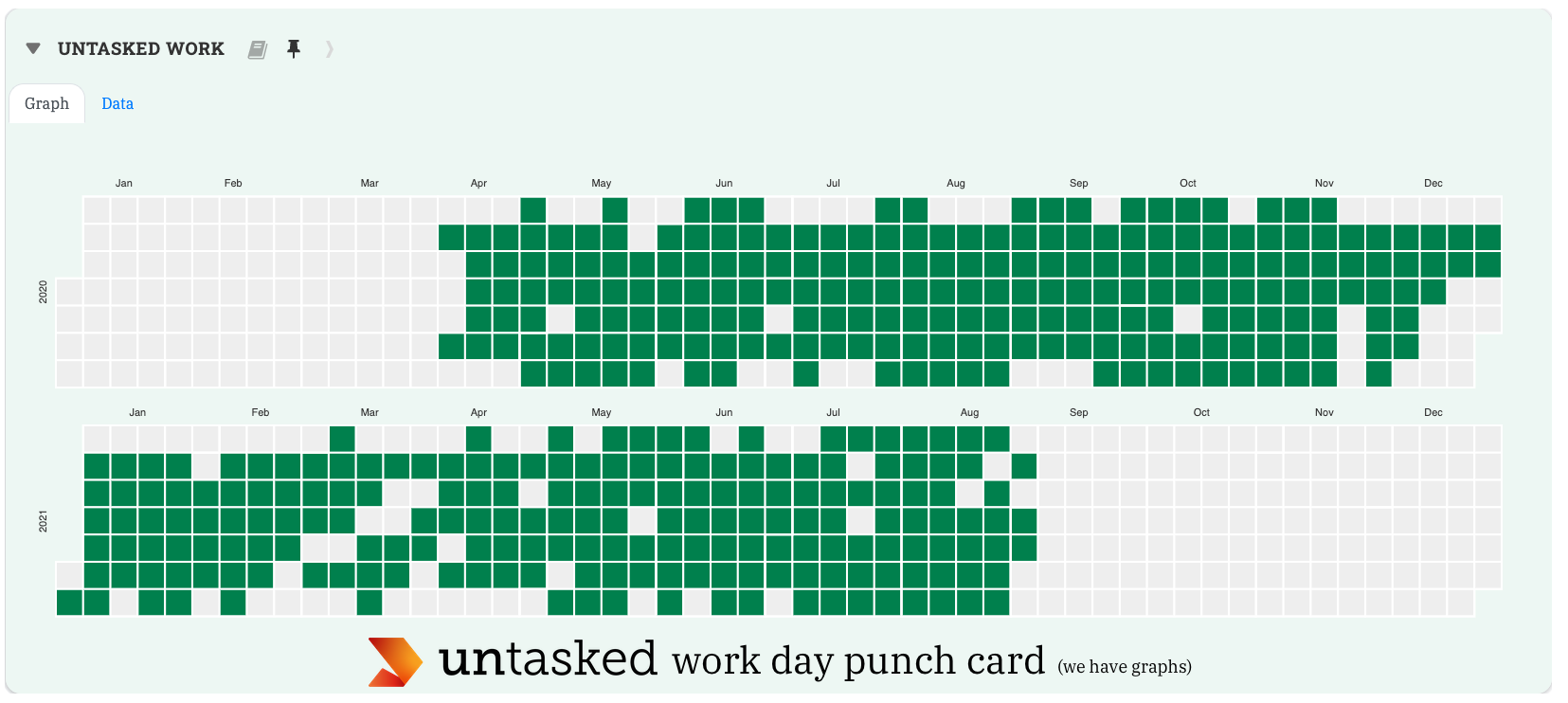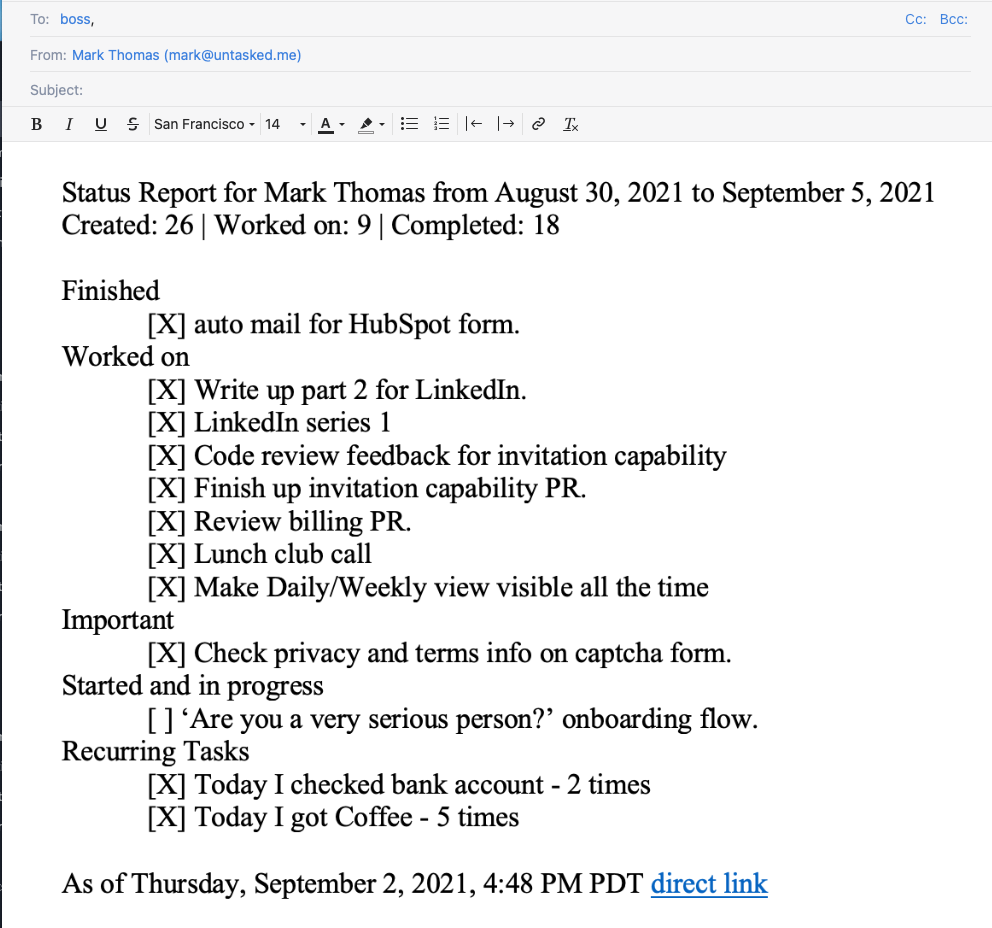Why untasked?
A new tool to improve work.
untasked represents years of work and even more years of thinking about how we work, and how we can make it better. It's a product for everyone who has ever had to do a status report, or explain what they were working on to someone who had no context or frame of reference. It's for people who regularly get asked by others for help with something, and it's for companies where it's just a little too difficult to figure out the right person to ask about a topic. Most of all it's for everyone who wishes it was just a little bit easier to get their work done, without being forced into working a particular way.
Here we are sharing a little bit about us, and our story. How did we get here and the why behind what we built. We aimed untasked at a set of challenges we see in modern work, even within great companies. I hope that as we share those reasons, and how untasked aims to solve them, it will motivate you to look at your own team and, if you see echos of these challenges, give untasked a try. We think it will save you some time and make it a little easier to get things done.
Before we get started for real, if you just want to skip to the end, you can sign up right now to get on our beta list. We have new teams starting in untasked every day, and we will not make you wait a year before you get in. Promise. Not ready to sign up? Feel free to browse the website absolutely free. We also participate in social media, where you can find many facts, and some jokes as funny as a website being free, in all the usual places.
From here forward though it's going to be a story, a story about a journey in at least two to four parts.
After years of working in some big-name technology companies, moving into some more traditional companies was an eye opener. There was, to say the least, some culture shock. In the technology world people -- and what is in their heads -- are the main asset a company has. The biggest lever you can pull to improve things is usually to free up their time to do the most important work. There is a large investment in tools and automation because every time someone needs to do something more than once or twice, especially if it is error prone or risky, there is always someone who can write a new piece of software to make sure it doesn't become something you have to do every day or every week. The results can be chaotic, but a technology company is far more likely to be powered by a huge number of automated workflows, tools, and processes that optimize for employee time than what I found in companies who, to be sure, used plenty of modern technology, but were not places where the product was technology.
What I learned as I began to understand how these organizations worked was that the kinds of systems that I took for granted were unfortunately very uncommon. Instead, many workers were left to struggle with challenges unrelated to the core of their job and are more aligned with the complexities of an organization that runs on knowing the right people or where the special form is. Ad hoc processes that are undiscoverable or invisible.
None of this is to say that these organizations were bad or failing. Some of them were in fact incredibly successful companies. It’s just that people had to work harder to get the same things done, and lots of potential was left on the table, unavailable to the organization because we moved slower than we could have, or spent our time in meetings, or putting energy into the kinds of things that were only indirectly related to getting the important work done.
Over a few years I started to really see how much time was being spent on these things that were not about getting things done. It was heartbreaking. People would sit down and explain exactly how they spent their time, and it was clear that many were unable to do the work they thought was important because they were checking the boxes to do things the “right” way or making sure everyone who could possibly object to their decisions was fully bought in before they even started. Communication was seen as a fix, but all it did was take more time away from getting the important work done. As a leader, I was spending hours reviewing and approving decisions that could have been made by the person doing the actual work. My uninformed opinion wasn’t better than the person who had just spent a week figuring out the solution, it was just higher up in the org chart.
Many people were disengaged while being incredibly stressed out. In retrospect it makes a ton of sense. You spend all your time doing things that are trivial and not core to the real work, all while preparing for a big meeting where people are going to judge your efforts not on the actual task but on the degree to which you prepared to be judged. The word you will find if you start to research this sort of task that’s not the actual work but is needed before you can do the work is meta-work. The work that you do that’s about work. Not the doing of the thing but the conversations, processes, preparation that go into being able to do the thing.
With this in mind we set out to make work life better for people. We know we can't solve it all, but if we can make it just a bit better, the impact for everyone is huge.
The meta-work crisis
First off, a definition:
Meta-work: Activities that are not directly connected to a specific work product but need to be done to produce that work product.
Every organization is different, but we all have examples of the meetings that didn’t need to happen or the busy work we do to make sure that someone is in the loop. It’s not making the thing, it’s the work you do so you can make the thing. Not all meta-work is bad. Preparation and conversations about the best way to do things and learning what has been attempted in the past can be very valuable.
One of the best things about meeting people in a new company is starting to see things from their perspective. Leaving the technology world opened my eyes. What I was seeing day in and day out was people spending a much larger percentage of their time on the meta-work than the actual work. The reasons why were varied, but the result was the same over and over. It was in fact an existential crisis; commercial success is hard enough when everything is going smoothly, but when you take half of your people’s time and throw it away, more and more of your outcomes are going to be less than you hoped.
Despite very hard work by many talented people, big goals and projects were often unachievable because so much time was spent in the meta-work of planning and getting started that there was no time left to do the actual work needed to accomplish the goal. If you were to track the productivity of a team, including the meta-work, and use it to extrapolate how long it would take to accomplish a big initiative it would look like almost nothing was possible. The timeframes and investment projected would seem so large that no business plan could possibly make sense. Projects looked more and more risky, and that risk would get internalized into plans. Year after year the time available to make things would get shorter and shorter each cycle with the extra time going into the work to get buy off on the ever-shrinking goals.
The more time I spent working in this way and trying to eliminate friction from my team, the clearer it was that the solution needed to be personal and individualized to each team member, while also being pervasive in the organization. You can’t just tell people to stop doing some particular meta-work because it might be so tightly coupled with the actual work that skipping it might be a career-ending mistake. Instead, you need to chip away at it from the inside, streamlining one thing at a time, making it easier for people to take the path of least resistance and having that be the right path. From this environment untasked was born.
Every hour we spend on meta-work is an hour when actual work isn’t getting done.
So much of this kind of meta-work is repetitive, maybe not repetitive for everyone, but repetitive for someone. A couple of meta-work stories that might seem familiar:
Nia is responsible for handling non-disclosure agreements, it’s only a small part of Nia’s responsibilities but there are ten to fifteen each week as sales and business teams get engaged with new customers and partners. Ninety-five percent of them are standard and Nia just needs a few bits of information to structure the document and get the right legal signatures. However, most of the requests for new NDAs don’t have all the information Nia needs to just handle it, and they are all urgent. Nia spends a lot of time communicating back and forth with the requestor, trying to get that key information. Often it requires scheduling a call to explain the process, ask the questions, etc. For Nia, all the effort to extract the answers turns 30 minutes of work into hours of time.
Avery is working on a long-term project to introduce a new product. Lots of people in the company are really interested in it. Despite making a good amount of progress, most of the work Avery is doing is only visible to them, and the immediate team. Avery makes decisions every day as they work toward the best possible product, but with so many interested Avery spends hours each week explaining her decisions, and that’s before the inevitable
We should have a meeting to discuss that before you decide.
If all you were to look at was stock photos, you would think that meetings were moments of greatness where one person after another shared great truths and wisdom with a rapt audience. I don’t need to tell you that the reality is far different. What I do (apparently) need to tell you is that this entry got kind of serious, which isn’t really on brand.
The joke that could have accompanied the above is available on the untasked twitter feed, exclusive content just for the folks who read all the way to the middle. I strongly encourage you to go there and follow us. It will be worth your time.
We have all had new reasons in the last eighteen months to learn that there is a limited amount of time in the day. For so many of us, priorities are different than they have ever been before. We need to make our time count. What those reasons have in common, and what so many of our stories share is that while we all work in teams and big organizations, much of the important work is done individually. We get in sync with others and then execute individually.
Untasked is all about making it easier to get things done in any organization. We start with the individual. It’s about you! In today’s complex work environment people work on many projects and teams at the same time. It’s near-impossible to manage your time and work without some way to merge the group- and team-related work with the more tactical items that are just for you. Everyone has their own ways of being organized and when we attempt to force a single way of doing things on everyone it seldom delivers.
So many systems and tools expect us all to work the same way and ask to define that set of rules for how people work. Or worse, they don't ask at all, and simply define the way we're expected to work. They force us to translate our work into unnatural shapes. In contrast, untasked gives you an individualized and individually customizable view of your work. A virtual desk of your own where you control what you see and decide what’s important for you right now. Your organization and team are right there, one click away, but you choose what information and process from the organization you want to pull into your space. My desk, and the way I work, looks different than yours, and that’s a good thing.
This mindset led us to the first rule of untasked, we will never try and force you to work in some different way, or with some set of rules we made up to sell our methodology. We are here to make it easier to do your work in the way that makes sense to you.
We use this individuality to bring organizations together and make it easy for you to find the right person to help with something. Context is so important to success when your team is starting to get bigger.
Find the right person, share context, get more done.
Thanks for sticking with us. I’ll remind you that this is all coming together into a seamless creation story that would make Tracy Kidder proud, alternatively it’s a study in which writing tools default to the use of ‘apostrophes’ vs 'apostrophes' and how many people on your team are actually “detail oriented”.
We have talked about meta-work, and how the solution to helping people avoid the unnecessary burden of it requires an individualized approach. untasked takes that individualized approach when it comes to how you view and manage your work, but we know that groups, teams, and organizations are equally important, especially when it comes to working together.
If you have ever been the new person in an organization or been at a company that grew quickly in a very short time you will understand exactly how difficult it can be to find the right person as organizations get more complex. When there are ten people, it’s easy to know everyone’s name, what they are working on and a little bit about them. When there are 10,000 it’s impossible. At many companies there might be a directory, or webpage, but at best they will show you the formal org chart, it’s not that helpful. Some companies don’t make even an org chart available.
From experience we know that it’s often almost impossible to figure out who is responsible for what kind of work. Over time you will learn something about who does what, and maybe even how the whole system works, but in a very large organization that could take years and be limited to just one division or group.
What’s missing, and in most cases non-existent, is the informal org chart that connects people based on the kind of work they do, their skills and experiences, and the people they work with regularly. The bigger your company the more likely it is that for each type of work there is an expert, or perhaps it’s their job to make sure that work like this gets done and done right. That person is often the best person to help you get something started. Effortless teamwork should be easy, but there are often two thing standing in your way.
First, finding the right person. For those of us working in small companies it’s easy but once your company is big enough that you can’t know everyone’s name it can be a lot harder. In the before-times you might know enough to know that you had to head to a specific part of the building to find a particular department, but with so much of us living in a remote work world even that help is gone. Should you interrupt someone you do know to tap into that informal org chart?
Second, if you manage to find the person who knows exactly what to do you may be engaging a different part of the company. The best person to help doesn’t know who you are and may not know anything about the specific thing you are working on. They are focused on their job, and getting their work done. In some cases, they may employ specialized tools or operate in a regulated field that’s very different than yours. How do you get them all the information they need to do this task that they are expert in, and you may know nothing about?
Many organizations answer both these questions with meta-work. Perhaps a phone call, or a meeting. Or maybe you just email a bunch of people and hope someone can take the time to help you. In isolation it’s usually not that bad, but when you have people from all over the company calling you because you are the expert it starts to add up quickly.
untasked takes a different approach. We know that that sometimes it feels easier to do something yourself than wade through a complicated company structure to find someone who can help you get something done, so we have a place for you to find people who are working on specific things, can help you with a task, or have done similar work before. You can also build out a profile for yourself to tell people what you are working on and have done in the past. Now you can be found based on the work you are proud of. People all around the organization are doing great work, finding them shouldn’t be difficult. That informal org chart should be based on work, and accessible to you on your first day.
We also know that everyone has skills and responsibilities that align with the work they are best at or the work that they have some ownership of within an organization. For example, a legal department is typically responsible for all legal work in the company because it’s a specialized skill. untasked allows you to define your capabilities, the work that you are best suited to perform, and gather the information you need to do it the right way the first time. Each capability comes with an opportunity for you to gather the context you need to avoid that difficult process of explaining to someone the questions you need answered to get that work done.
Instead, the new work is funneled onto your individual desk in a way that fits with your personal workflow, including all of the context you need to be successful. You don’t need to worry about the communication part of doing this kind of work because both the recipient and the requestor can always see the task as it moves from start to done.
Having a shared task with everything attached means there is no need to look up an email later or find that one chat message from last month. Follow up or questions? Just add a note to the task. You can also attach workflows, routing the task through whatever process makes sense for your organization, including approvals, scheduling, attachments and more.
Even better we work hard to route people who are starting new work that overlaps with a capability directly into the established process, skipping the whole step of figuring out that there is someone who can help them.
With untasked your individual task manager seamlessly connects you to the people who can help you get more done and helps you answer the questions that they need to do it right the first time, without any extra effort. It’s a lot like how we managed to get all the apostrophes right here the firstsecond time just by picking the right tool, except at organization scale.
Create an environment where everyone can do their best work.
This is it, the last part, four parts is enough for almost anything. One last reason, one last feature, one last call to action.
Work plays a huge role in our lives. For most of us it’s the biggest single activity outside of sleep. Yet when people are asked to rate the enjoyment of activities, work is somewhere above cleaning chores and somewhere below pet care. It’s work so it might not be realistic to expect everyone to rate it as highly as theater, concerts, and sporting events, but we can do better.
There are a lot of reasons why people are disengaged or unhappy at work and we can’t claim we solve them all, but one big recurring theme is feeling like their work isn’t valued. It’s easy to imagine scenarios where someone spends half of their week wading through meta-work, to get one meaningful thing done and then no one even notices or realizes that something important just happened.
One of the best ways to fix this problem is to make sure that everyone knows what’s going on across as large a swath of the organization as possible. Letting people celebrate the work of their peers, and see those big accomplishments is great and brings people together. It’s surprisingly hard to do this though, especially without making people spend way too much time explaining what they do, and why. It’s one thing to require someone to spend fifteen minutes gathering the accomplishments of the week if you are going to spend hours on Friday night writing a critically acclaimed internal newsletter that everyone will be talking about on Monday, but most of these status updates end up glanced at once and filed into the nested email folder of no return.
At untasked we know that you have a lot to do; making more work isn’t doing anyone any favors. If you are doing your job, it shouldn’t require even more work to show that you have done it, but millions of us spend time trying to explain the status of something to someone.
So, if you keep track of your work in untasked, your most interesting and important work will be automatically selected via our workscore algorithm. We will gather it together in one place for you as you get things done. You will find the process of generating a status report has been 100% automated so that everyone who needs it is able to catch up on your progress without forcing you to stop and explain what you just did. There is even a one-click button to copy a text version that you can file straight into that special email folder.
Way, way back at the beginning this was about “Why untasked?”, in truth the answer is that we have watched so many people having a more difficult and stressful work experience than it needs to be. People forced to change themselves to fit into a tool designed for the “average worker” with no space of their own. People spending so much time on meta-work they have nothing to show for the time. People struggling to accomplish a task that might be easy if they could just find the right colleague to help, and those same experts spending more of their time trying to explain what they need to provide help than accomplishing the goal. People wasting time on work that could be automatic, leaving less time for the important work.
Untasked sets up a space where you and your team can work together when you need to and individually when you want to. Communication is focused on the work you need to do and closely connected to it. Bit by bit, interaction by interaction, we aim to remove meta-work from the equation. Not by simply ignoring it, but by taking on the responsibility within a shared system so no-one must pay the cost of it on their own. Technology is at its best when it makes our lives easier without requiring us to change to take advantage of it.
If any of our whys or reasons resemble your work life, or you think, like we do, that work could be just a little bit easier, we hope you will take the time to give us a try in your organization. Stop by and let us know how we can help make work better for you and your team. We are focused on making sure that untasked is right there beside you, freeing you up to do your best work.
That is why we made untasked. There is no one system that’s perfect for everyone, but the right system is the one that lets you say, “this feels like it was built for me”.
Get started with untasked
A better experience for your team, fewer headaches in your quest to get things done. Set yourself up for success in minutes.
